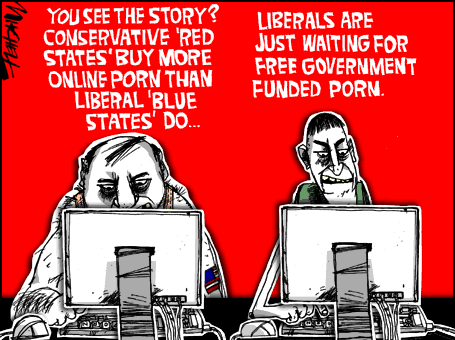
Forget the whole red-blue dichotomy. Maybe we do agree on things, after all? "That, at least, is the conclusion of a study conducted by the Program for Public Consultation (PPC)....The analysis found overwhelming convergence in attitudes, regardless of the makeup of the state or district where people live....Kull doesn’t dispute the fact that Congress is polarized along partisan lines. But he said it’s wrong to blame that on a polarized population. Members of Congress, he said, are responding not to their constituents but to the power...of special interests that have their own, partisan agendas." Dan Balz in The Washington Post.
Counterpoint: Why gridlock in Washington is your fault. "The main problem with the study is that it focuses on red and blue states/districts and not red and blue people. The fact is that the vast majority of states and districts include healthy amounts of both Republicans and Democrats....Those large clumps of opposition voters in both red and blue states mean that, unless either side is overwhelmingly united on a given issue (i.e. more than 80 percent), a red state is likely to have the same position as a blue state, and it's going to look like a big kumbaya moment." Aaron Blake in The Washington Post.
Our misperceptions of polarization's extent may make us more polarized. "Participants given the correct information were 8 percent more moderate than those not given the correct information. Among participants who actually reported being surprised by this correct information, the effect was even larger....Telling people that the world isn’t as polarized as they thought actually made their own views more moderate. To be sure, there are real differences in political opinions between liberals and conservatives. But Ahler’s work — as well as some other research — suggests that we don’t perceive those differences accurately." John Sides in The Washington Post.
What remains of the political center? The answer's not so simple. "We are in a time in which there are both rising expressions of independence from the two major parties by many Americans and elections in which the red-blue divisions are increasingly stark. Party identification tells one part of it, the story of a country moving away from allegiance to the major political parties....Voting behavior tells a different story....The percentage of true independents may be only about 10 percent of the electorate....However disparate, however disengaged and whatever its size, the middle of the electorate cannot be ignored by either party." Dan Balz in The Washington Post.
Video interview: Can Larry Lessig defeat polarization? Vox.
Partisan conflict is a drag on the economy. "Partisan political bickering is driving up government budget deficits and holding down job creation, business investment and overall U.S. economic growth, according to new research from the Federal Reserve Bank of Philadelphia. The economic effects of rising partisan conflict 'are not only large but also persistent' and 'may help explain part of the slow recovery following the Great Recession,' wrote Marina Azzimonti, an economist at the Philadelphia Fed, in a new working paper." Ben Leubsdorf in The Wall Street Journal.
Background readings:
Our previous coverage: The American center is shrinking.
Soft money's squishy political influence. Derek Willis in The New York Times.
No comments:
Post a Comment